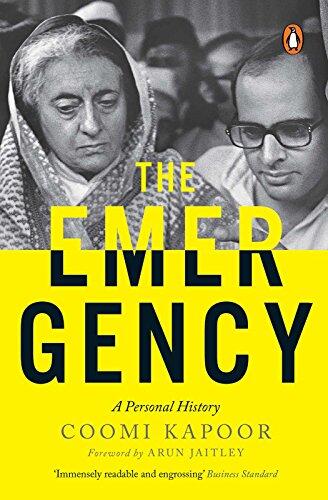
The Emergency: A Personal History
によって
Coomi Kapoor
まだ評価がありません
Horror
形式
キンドル
ページ数
336
言語
ヒンディー語
公開されました
Jan 1, 2016
出版社
Penguin
ISBN-10
9352141199
ISBN-13
9789352141197
説明
Coomi Kapoor's insightful narrative delves into a pivotal moment in Indian history, offering a personal perspective on the tumultuous events during the Emergency declared in June 1975. This period marked a dramatic suspension of democracy, where the government clamped down on civil rights and political freedoms. Kapoor's account captures the anxiety and uncertainty that gripped the nation, providing readers with a raw depiction of life under such oppressive circumstances.
Through a combination of personal anecdotes and historical analysis, the author weaves together the stories of individuals who lived through the Emergency, allowing readers to understand the far-reaching impacts on society. The narrative highlights the struggles of ordinary citizens, journalists, and political activists who resisted the authoritarian regime, often at great personal risk. Kapoor’s storytelling reveals not only the fear and desperation felt by many but also the resilience of the human spirit in the face of tyranny.
In her examination, Kapoor also reflects on the long-term consequences of the Emergency, addressing how this chapter in history continues to resonate in contemporary India. By providing context and insight, she invites readers to contemplate the fragile nature of democracy and the importance of vigilance in protecting freedoms. This personal history serves as both a cautionary tale and a powerful reminder of the dangers of political repression.
With a compelling blend of history, personal reflection, and political commentary, Kapoor's work stands out as a significant contribution to understanding the complexities of an era that shaped the Indian political landscape. She urges readers to remember the lessons of the past, fostering a deeper appreciation for the democratic principles that are often taken for granted.
Through a combination of personal anecdotes and historical analysis, the author weaves together the stories of individuals who lived through the Emergency, allowing readers to understand the far-reaching impacts on society. The narrative highlights the struggles of ordinary citizens, journalists, and political activists who resisted the authoritarian regime, often at great personal risk. Kapoor’s storytelling reveals not only the fear and desperation felt by many but also the resilience of the human spirit in the face of tyranny.
In her examination, Kapoor also reflects on the long-term consequences of the Emergency, addressing how this chapter in history continues to resonate in contemporary India. By providing context and insight, she invites readers to contemplate the fragile nature of democracy and the importance of vigilance in protecting freedoms. This personal history serves as both a cautionary tale and a powerful reminder of the dangers of political repression.
With a compelling blend of history, personal reflection, and political commentary, Kapoor's work stands out as a significant contribution to understanding the complexities of an era that shaped the Indian political landscape. She urges readers to remember the lessons of the past, fostering a deeper appreciation for the democratic principles that are often taken for granted.